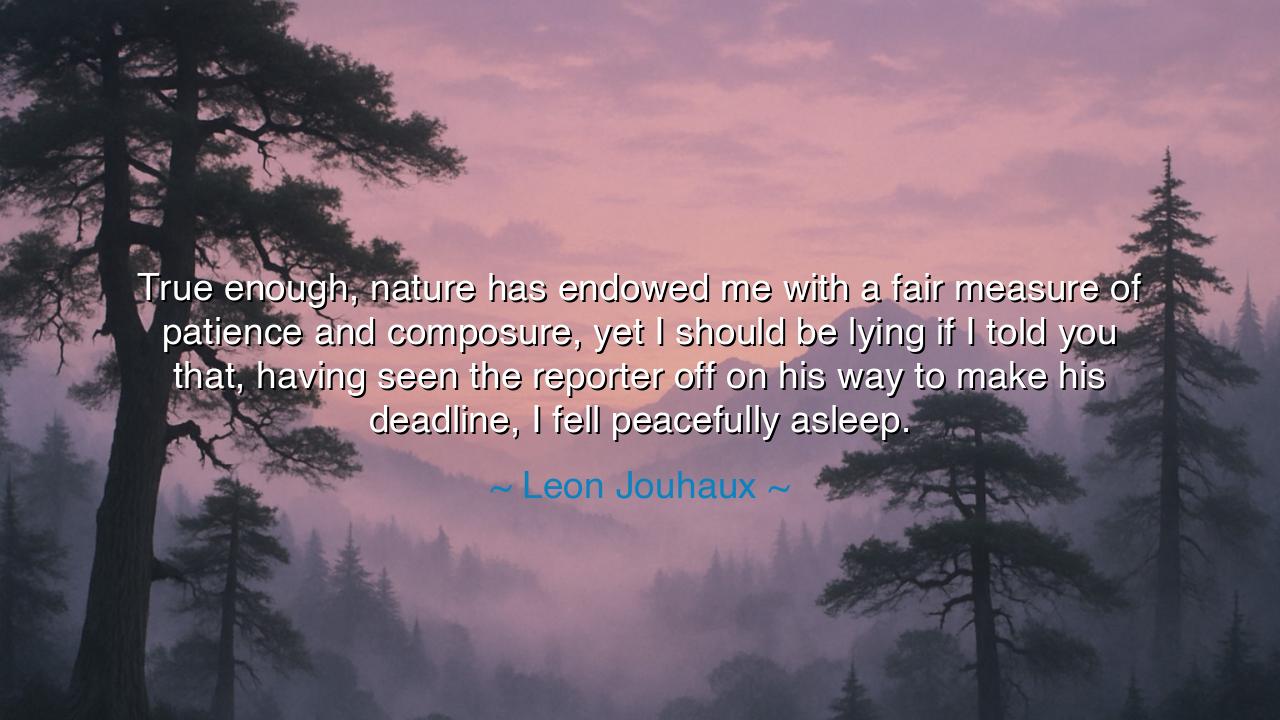
True enough, nature has endowed me with a fair measure of
True enough, nature has endowed me with a fair measure of patience and composure, yet I should be lying if I told you that, having seen the reporter off on his way to make his deadline, I fell peacefully asleep.






The words of Leon Jouhaux, Nobel Peace Prize laureate and tireless defender of workers’ rights, strike with a profound mixture of humility and humanity: “True enough, nature has endowed me with a fair measure of patience and composure, yet I should be lying if I told you that, having seen the reporter off on his way to make his deadline, I fell peacefully asleep.” In this statement, we glimpse the dual nature of the human spirit — outward patience and composure maintained in public, yet inward restlessness and turmoil that refuse to be silenced. It is the eternal struggle of those who carry the burdens of responsibility: to appear calm for the sake of others, even while storms rage within.
The meaning begins with Jouhaux’s acknowledgment of his natural patience. This virtue, a gift of temperament and discipline, allowed him to endure long battles in negotiations, strikes, and the ceaseless struggle for justice. Yet even he, blessed with such steadiness, confesses the truth that calmness does not erase concern. One may appear composed, but the weight of responsibility often lingers in the heart, denying rest even in the quiet of night. His honesty reveals that even the strongest are not immune to anxiety; they simply learn to master it outwardly for the sake of others.
The origin of this thought lies in Jouhaux’s life of struggle. As a union leader in France, he often dealt with journalists, political adversaries, and allies alike, bearing the heavy mantle of representation for the working poor. To the world, he needed to show control — a negotiator unshaken, a leader who did not falter. But in private, when the battles of the day ended, the mind did not so easily quiet itself. This duality — the mask of composure versus the unrest of conscience — is the reality of those who lead movements, who know that the fate of many rests upon their words and decisions.
History offers many parallels. Consider Abraham Lincoln, who was famed for his patience and composure, even under the crushing weight of civil war. To his generals and his cabinet, he appeared measured, thoughtful, and steady. Yet in the solitude of his office, he carried the grief of countless dead, the anguish of division, and the torment of choices that would shape a nation. Like Jouhaux, Lincoln did not always find peaceful sleep, but his endurance lay in balancing the inner turmoil with the outer calm demanded of his station.
The lesson here is deeply human: patience and composure are not the absence of struggle, but the mastery of struggle. Even the patient heart may tremble, even the composed spirit may be restless in the night. What matters is not the absence of anxiety, but the courage to continue one’s work despite it. Jouhaux’s confession liberates us from the illusion that great leaders feel no burden. Instead, it teaches us that they too wrestle with unease, but they do not let it rob them of their purpose.
For the modern soul, this wisdom is vital. In our lives, we too may be called to show patience when our hearts are weary, or composure when our minds are restless. The true test is not to pretend that we are unshaken, but to endure faithfully, knowing that restlessness is part of the journey. It is in the balance of inner storms and outer steadiness that resilience is born. The sleepless night does not erase the value of the day’s work; it only proves that the work matters deeply.
Practical action follows this teaching. When burdened, admit your humanity — confess, as Jouhaux did, that rest does not always come easily. Yet continue to cultivate patience, for it allows you to endure. Practice composure, for it gives strength to those who look to you for guidance. Accept that anxiety may accompany responsibility, but let it sharpen your awareness rather than destroy your peace. And above all, let your unrest remind you that you are alive, engaged, and committed to causes greater than yourself.
Thus, Jouhaux’s words must be remembered as both confession and counsel: patience and composure are noble, but they do not erase the human heart’s restlessness. Even the strong feel the weight of their struggles. Yet by enduring despite sleepless nights, by continuing despite inner turmoil, we join the lineage of those who change the world — not because they are untouched by struggle, but because they bear it with courage and truth.






AAdministratorAdministrator
Welcome, honored guests. Please leave a comment, we will respond soon